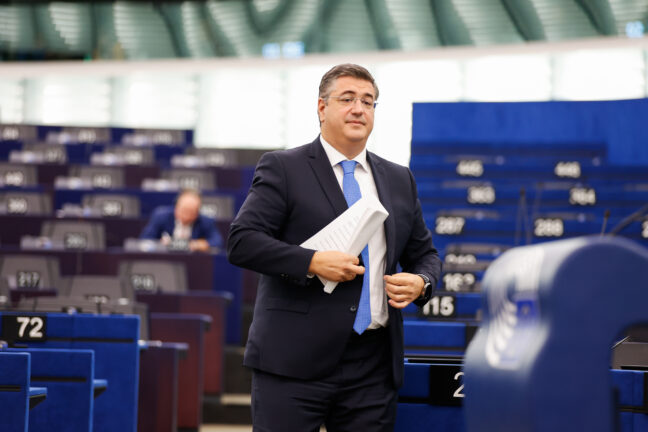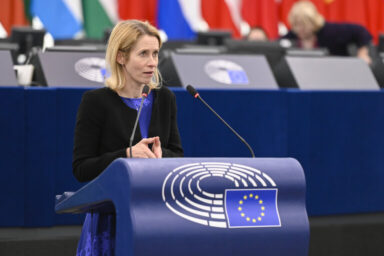Apostolos Tzitzikostas coasted to a triumphant victory in the European Parliament as Europe’s clocks stood accused of crimes against civilisation. In a rare display of political unity, MEPs of all persuasions lined up to support the commissioner’s bold idea to put an end to the atrocity of Daylight Saving Time.
European Commissioner for Transport and Tourism Apostolos Tzitzikostas swept into the European Parliament on Thursday, 23 October, with the gravitas of a man ending an era. His proposal to abolish the barbarous relic of bygone days, namely the Daylight Saving Time, won MEPs‘ universal support.
Unnecessary complication
Shoulder to shoulder, the Patriot and the Socialist, the Christian democrat and the Green liberal rose to shake off the shackles of the seasonal clock change. The explosive debate featured 16 speakers, including chair Sabine Verheyen (EPP/DEU) and Mr Tzitzikostas; all of them donned the abolitionist mantle, deriding the annual practice of springing forward and falling back 60 minutes in the strongest possible terms.
The commissioner set the tone with a fiery speech worthy of Demosthenes, his fellow Greek oratorical hero. “For what purpose, since it no longer serves any purpose?“ Mr Tzitzikostas started out in medias res. “The seasonal time change has become a source of unnecessary complication for society. Take the transport sector, for example. Operators have to adjust departure and arrival times twice a year, often at the cost of confusion and frustration for passengers,“ the commissioner thundered.
“Research shows that these forced clock changes disrupt our inner body clock, interfering with our sleep routine and our metabolism. In the short term, they reduce our mood, energy, and alertness, which already lowers productivity at work and road safety,“ Mr Tzitzikostas said before citing „higher risk of different illnesses“, banking on the omnipresent fear of the unknown.
You might be interested
Responsibility to act now
“We have, honourable members of the European Parliament, the responsibility and the possibility to act now. When the Commission asked Europeans for (people’s) views, a record-breaking of 4.6 million citizens responded, the highest participation rate ever in a Commission public consultation. The citizens’ message was loud and clear: 84 per cent want us to end this absurdity of changing the clocks twice a year,“ the commissioner said, going for the jugular.
It quickly became apparent that the temporal oppression of the DST ranks high on the list of the honourable members‘ favourite peeves. MEP Jüri Ratas (EPP/EST) recommended that „everyone stay in their own time zone and we stop turning the clocks“ before exhorting his fellow parliamentarians to act as “people are waiting for us to decide“.
Maybe we should just find a different way of remembering how to do things. — MEP Johan Danielsson (S&D/SWE)
Johan Danielsson (S&D/SWE) took a shot from a different angle. “Madam President, twice a year we do something that most people don’t even understand anymore,“ he said, citing a shockingly conservative estimate of the figure. He recalled that as early as 2019, the European Parliament adopted its negative position to the DST. “With a broad-ranging majority, we decided that this change of time would be got rid of as quickly as possible. And now we’ve been waiting for the member states for six years,“ he lay the blame squarely on selfish European capitals.
Wider injustices
Then the Swedish Socialist delivered his final blow: “For those of us who forget or don’t remember whether we’re going to turn the clocks forward or back, or we’re going to stick our furniture in the garden or not, maybe we should just find a different way of remembering how to do things,“ he said without any apparent connection to the topic at hand.
MEPs Julien Leonardelli (PfE/FRA) and João Oliveira (The Left/PRT) may come from nominally opposite fringes of the political spectrum, but an issue of the DST’s magnitude worked wonders even for them. They stood united not only against the chronological indignity but also against the wider injustice of the European Union per se.
Now we have to democratise things, democratise the time zone. — MEP An Miranda Paz (S&D/ESP)
“Seasonal time change and decisions thereon should be based on the decisions of the people and the scientific community,“ Mr Oliveira contended. “What is not acceptable is the EU meddling in this matter.“ Mr Leonardelli joined in, painting a somewhat bleak picture of Brussels‘ decision-making.“This is the perfect example of what the EU is, a technocratic machine which doesn’t listen to the people, obsessed by useless, absurd decisions, and it’s always top-down,“ he said.
‘Like the clock, he lost his place‘
Worse still, others felt inspired. MEP Joachim Streit (Renew/DEU) and his fellow German Lukas Sieper (NI/DEU) penned—and recited—their DST-sparked poems. “Summertime, wintertime, water loss/Whoever thought this up wasn’t thinking of us,“ Mr Streit lyrislative effort soared through the chamber. “Joachim rhymes with gentle grace/but like the clock, he lost his place,“ Mr Sieper responded with an ad hominem retort.
Ana Miranda Paz (Greens-EFA/ESP), who hails from the Spanish province of Galicia, used the occasion to pick a fight with two formidable opponents simultaneously — geography and history. “Maybe you know that Galicia is a country or a region with the greatest gap between the official time and something known as solar time. So there’s two hours of difference, two hours. So the reason for this goes back to Franco back in 1940. He changed Spain’s time zone to adapt it to Nazi Germany. But now we have to democratise things, democratise the time zone,“ she offered a steely, if somewhat non-sequitural argument. “So we have the same time zone as in Belgrade,“ the MEP cited the embarrassment.
Other members chipped in the lively debate. Siegbert Droese (ESN/DEU) shared that “this idea of changing time has been hidden behind for people not to take any decision“. He also informed the chamber that “politics is here to take decisions, not to administer“ before joining the chorus of DST disapproval.
Gloriously unified
Manuela Ripa (EPP/DEU) remarked that “animals suffer from [the DST] as well, sometimes with dramatic consequences“. Marcin Sypniewski (ESN/POL) said that the clock change “belongs to the Middle Ages, basically, when people were trying to save energy“, probably sending shivers down the spines of energy conservation-minded colleagues.
This is the first time (…) that we all agree to adopt common sense. — Apostolos Tzitzikostas, European Commissioner for Transport and Tourism
Kristian Vigenin (S&D/BLG) proposed—in jest, to be fair—to storm the European Council meeting. “Today we will have the European Council meeting, so maybe it would be a good idea for the commissioner to take us with him, and then we could go there and remind the European Council that this is the problem that the Council doesn’t want to solve.“
It fell to Commissioner Tsitsikostas to conclude the debate, and he did so with appropriate flair. “Thank you for this really valuable discussion. (…) This is the only, the first time during at least this term of the Parliament that we all agree, we agree to adopt common sense,“ he treated the lawmakers to an unorthodox compliment. “And I will give a fight with you until we finally stop changing clocks in Europe,“ the heir to Demosthenes drove the point home. A gloriously unified European time across seasons appeared just around the corner.
One hundred years of distortion
Changing the clocks in spring and autumn in Europe is a habit that pre-dates the European Union, the Council‘s press release reads. It was introduced to save energy during the First World War and enjoyed a revival in many countries in the 1970s.
The EU first legislated on summer-time arrangements in 1980, with a directive that coordinated existing national practices to help ensure the smooth functioning of the single market.
Both the Council and the European Parliament have to agree in order to pass the legislation needed to end the seasonal time changes. The European Parliament first adopted its position on the proposal in March 2019, and voted in favour of ending daylight saving time in 2021. The Council has not yet agreed its position on the proposal. To form a Council position, a qualified majority of member states is needed.











